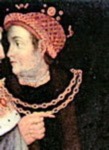Clement-Jones family - Person Sheet
Clement-Jones family - Person Sheet
Birth1462
Death1510
FatherJohn SUTTON , 13087 (1427-1495)
MotherElizabeth BRAMSHOTT , 13105 (1430-1499)
Notes for Edmund DUDLEY
Edmund Dudley was the son of Sir John Dudley of Atherington and a grandson of John Sutton, 1st Baron Dudley. After studying at Oxford and at Gray's Inn, Dudley came under the notice of Henry VII, and is said to have been made a privy councillor at the early age of 23. In 1492 he helped to negotiate the Peace of Etaples with France and soon assisted the King in checking the lawlessness of the barons. He and his colleague Sir Richard Empson were prominent councillors of the Council Learned in the Law, a special tribunal of Henry VII's reign, which collected debts owed to the King, requested bonds as surety, and employed further financial instruments against high born and wealthy subjects. Henry VII took a strong interest in these procedures and closely supervised the accounts of the two men.[1]
Dudley was Speaker of the House of Commons in 1504. While collecting the King's money, Dudley amassed a great amount of wealth for himself, which resulted in estates in Sussex, Dorset and Lincolnshire. When Henry VII died in April 1509, Dudley was imprisoned and charged with the crime of constructive treason. Dudley's nominal crime was that during the last illness of Henry VII he had ordered his friends to assemble in arms in case the King died, but the real reason for his charge was his unpopularity stemming from his financial transactions. He was attainted and made preparations to escape from the Tower of London. He gave up his plan, though, when parliament did not confirm his attainder,[3] which led him to believe that he would be pardoned. Dudley and his colleague Empson were executed on 17 August 1510 on Tower Hill.
During his imprisonment Dudley sought to gain the favour of King Henry VIII by writing a treatise in support of absolute monarchy called The Tree of Commonwealth.[1] It may never have reached the King, however. Several manuscript editions survive, the earliest was possibly commissioned by Dudley's son John Dudley, Duke of Northumberland, while the second oldest was made by John Stow in 1563 for Dudley's grandson, Robert Dudley.[
Dudley was Speaker of the House of Commons in 1504. While collecting the King's money, Dudley amassed a great amount of wealth for himself, which resulted in estates in Sussex, Dorset and Lincolnshire. When Henry VII died in April 1509, Dudley was imprisoned and charged with the crime of constructive treason. Dudley's nominal crime was that during the last illness of Henry VII he had ordered his friends to assemble in arms in case the King died, but the real reason for his charge was his unpopularity stemming from his financial transactions. He was attainted and made preparations to escape from the Tower of London. He gave up his plan, though, when parliament did not confirm his attainder,[3] which led him to believe that he would be pardoned. Dudley and his colleague Empson were executed on 17 August 1510 on Tower Hill.
During his imprisonment Dudley sought to gain the favour of King Henry VIII by writing a treatise in support of absolute monarchy called The Tree of Commonwealth.[1] It may never have reached the King, however. Several manuscript editions survive, the earliest was possibly commissioned by Dudley's son John Dudley, Duke of Northumberland, while the second oldest was made by John Stow in 1563 for Dudley's grandson, Robert Dudley.[


